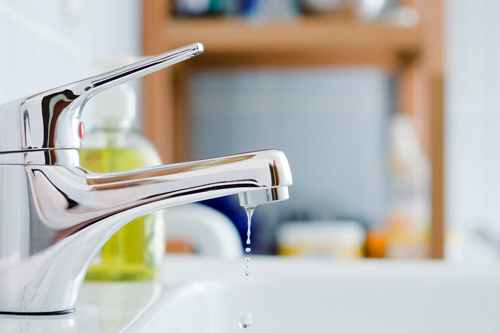Water softeners are common in homes throughout Maryland, but even homeowners who utilize them often fall for some of the most common myths about water softeners. Whether you are considering getting a water softener but not sure if it will really make a difference or not sure how exactly your water softener works, Atlantic Blue Water Services is happy to help dispel the most common myths about water softeners.
1. Softened Water Has All Contaminants Removed
This is one of the most common myths about water softeners, as some people believe that merely softening the water is a replacement for treating or filtering it. In reality, that is far from the case. Water softeners are designed to make hard water less hard, not to remove other chemicals and contaminants that might be present. The resin beads in your water softener hold a negative charge and sodium ions. When the water passes through these resin beads, the sodium ions will be exchanged into water for the calcium and magnesium irons. This means that, while the excess calcium and magnesium will be removed, there could still be other hazardous things present in the water.

2. Softened Water Contains a Lot of Sodium
Another one of the most common myths about water softeners is that they create water with high levels of sodium. In reality, it is perfectly healthy to consume water that has been softened with a water softener. In almost every case it will have no effect on your diet. For example, water that has a hardness level of 10 grains per gallon has about 35 mg of sodium per glass after being softened. In contrast, a tablespoon of ketchup with your dinner has 204 mg of sodium. If you have a low salt diet due to health issues, Atlantic Blue Water Services can help to find alternative softening options for you.
3. The Salt in Your Brine Tank Doesn’t Matter
All salt is not the same when it comes to filling your brine tank to soften your water. Using the purest possible salt that does not contain contaminants ensures that your system will continue to run as efficiently as possible and need less cleaning. When you’re softening your water, the last thing that you want to do is introduce more contaminants! Solar salt, pellet salt and min-cube salt are all great options for your water softener.
4. A Water Softener Wastes Water
Older, outdated water softeners are the cause of one of the other most common myths about water softeners. A few decades ago, water softeners were not as efficient, and they would not do the best possible job avoiding waste. Today’s water softeners will use salt and water responsibly to ensure that waste is minimized and your investment goes as far as possible. With today’s technology, those with a water softener will typically use less water because soaps and detergents react poorly with hard water and many homeowners end up using excessive water to get the job done.
5. If You Have City Water, a Water Softener Is Unnecessary
While municipal water has a higher probability of not requiring additional treatment than a private well, that does not mean that it will be perfect when it gets to your home. One of the most common issues that many homeowners have with city water is elevated hardness levels. Over 85% of homeowners in the United States have some degree of elevated hardness in their water, so there’s a good chance that having your water tested and softened properly can ensure you are getting the most out of your water and your appliances that use water.
6. Water Softeners Are Too Expensive
Some homeowners wait to invest in a water softening system because they assume that it is too expensive or that the maintenance costs are exorbitant. In reality, the costs of not using a water softening system if you have hard water can be more expensive than the investment in a water softener. Your water softener will make sure that appliances and products that rely on water are as efficient as possible, so you will not need as many repairs and will not need to replace things as quickly.
7. Water Softeners Remove Things That Are Good for You
Water softeners do remove excessive calcium and magnesium from your water. Some people believe that these minerals are essential, and they are part of a healthy diet. However, consuming them in your regular diet is the right way to get calcium. If you are drinking them instead, they are still in their organic form and will not be processed by your body in the same way that they would if they were minerals naturally found in food.
8. Water Softeners Make Water Taste Salty
Another one of the common myths about water softeners is that adding small amounts of sodium into your water will make it taste salty. This is not the case, and many times there is not much sodium added to the water at all. The harder that your water is, the more sodium that will need to be added to remove the excess magnesium and calcium. The amount of sodium present in softened water is so low that you will not be able to taste it or notice that anything is different. In fact, many people prefer the taste of softened water over the taste of hard water, as the presence of too much calcium and magnesium can give water a distinct and unpleasant smell or taste. If you are concerned about how softened water might taste, don’t hesitate to contact Atlantic Blue Water Services to learn more.
Call Atlantic Blue Water Services to Bust the Myths About Water Softeners
Atlantic Blue Water Services is here to help homeowners, home sellers, home buyers and business owners in need of a quality water test in Pikesville, MD or a new water softening system. Call us today to schedule your water testing at 410-840-2583.
